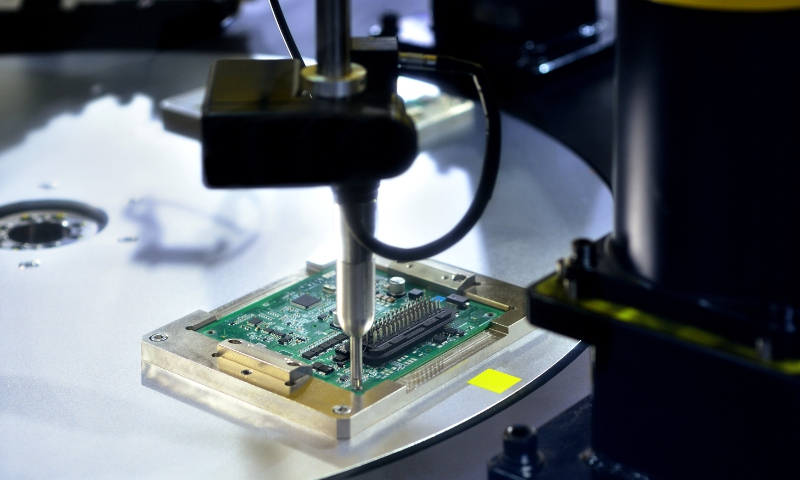
Production of semiconductor chip File photo: VCG
Efforts by US lawmakers to restrict RISC-V chip technology, with a focus on China, are likely to fail, as Chinese technology companies have remained resilient and achieved greater self-reliance under the relentless US crackdown, Chinese experts said on Saturday.
This pattern of unsuccessful attempts has been consistently demonstrated during the past months despite the "tech war" initiated by the US, which has failed to contain China's technological development but caused rising losses to American companies and dented their industry advantages, experts said.
Described it as a "new battleground," Reuters reported on Saturday that some US lawmakers are pressuring the Biden administration to restrict American companies from working on a freely available chip technology widely used in China - RISC-V.
Based in Switzerland, RISC-V is an open standard instruction set architecture, provided under royalty-free open-source licenses and designed for a wide range of uses from smartphone chips to advanced processors for AI.
"For starters, this is an open-source technology, and the intentions of US lawmakers to isolate US businesses from the mainstream industry simply lack logical merit. It appears to be more of a political stunt by American politicians - sanctioning American firms to contain the advance of China," Ma Jihua, a Beijing-based senior industry analyst, told the Global Times on Saturday.
Chinese companies are not giving up on the use of the technology and they have already shaped an industrial chain that spans from research and development to application, Ma said, adding that more than 50 percent of the RISC-V chips in the world are produced by Chinese companies.
If this illogical US restriction is implemented, in addition to the negative impact on American companies, the development of global RISC-V industrial system will slow down, which would be a much worse outcome, Ma said.
In an ill-intended effort to curb China's technological advance, the US has significantly escalated suppression on China's high-tech companies in recent years. However, none of these companies have collapsed, but they have only become stronger and invested more in technology, experts said.
"An increasing number of the 'bottlenecks' are being broken, enabling China's technology sector to continuously achieve greater levels of independent innovation," Liu Dingding, a Beijing-based veteran tech analyst, told the Global Times on Saturday.
Huawei, for example, overcame the US blockade and launched a new 5G smartphone using domestic chips, Liu said. This shows that attempting to contain the technology advance is doomed to fail.
As the US move goes against the laws of the economy, it is impossible for American politicians to achieve their goals. Nvidia, Intel and Qualcomm, three of the world's largest chipmakers, have all warned that cutting chip sales to China would hit their businesses badly, according to media reports.
Pointing to the potential RISC-V restriction, Ma said that US companies will oppose it as they will have to bear the ultimate pain.
American politicians still refuse to admit that the US has lost the possibility of hitting China's tech industry on a large scale, and it "has already lost its tech war against China," Xiang Ligang, director-general of the Beijing-based Information Consumption Alliance, told the Global Times.




